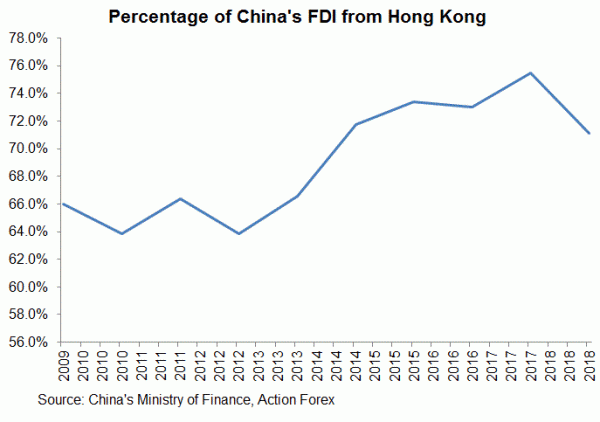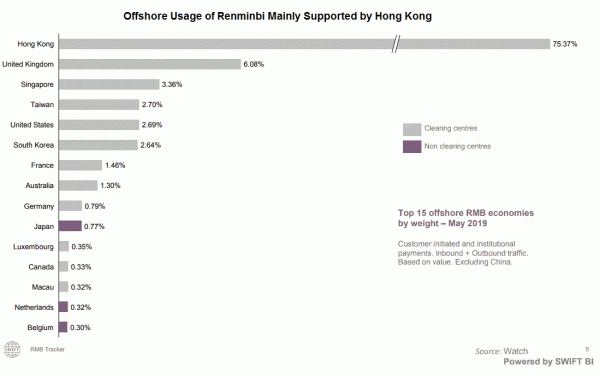Five years since the Umbrella Movement, Hong Kong has once again been in global spotlight. Just a week after a march by over a million protesters, about two million of Hongkongers took to the streets against the proposal of extradition bill amendment. The issue has caught so much international attention that Donald Trump views it as the ammunition for trade negotiations with China in the G20 summit. The US Congress has recently warned of amending the US-HK Policy Act which is critical not only to economic developments of Hong Kong, but also to mainland China, the world’s second largest economy. Under the Policy Act, Hong Kong is considered as a non-sovereign entity distinct from China. Such consideration has also granted Hong Kong the status of a separate customs territory. Yet, the US Congress and the US President, by signing an executive order, have the right to suspend the application of any part of the Policy Act if Hong Kong is deemed to be “not sufficiently autonomous to justify treatment”. The world is closely- watching whether Trump would raise the Hong Kong problem in his meeting with Xi Jinping.
The proposed extradition bill amendment, if passed, would demolish the “one-country- two- systems” framework operating in Hong Kong since its handover from the UK to China in 1997. Such framework ensures that Hong Kong would continue to enjoy a high degree of autonomy, except for foreign and defence affairs. It is also entitled to independent executive, legislative and independent judicial power, including that of final adjudication. Notwithstanding its political nature, the “one-country- two- systems” framework has made enormous economic sense. It is not at all exaggerated to describe it as a cornerstone for mainland China’s skyrocketed economic and financial developments over the past decades.
Despite the promise of opening up its market for foreign investments as member of the WTO in 2001, the progress has been sluggish. In China, the deeply flawed legal and regulatory system, the lack of transparency in information transfer and the tight-grip control in the Communist Party leadership have been barriers to both foreign investments trying to tap the Chinese market, and Chinese capital to explore overseas opportunities. Hong Kong, with its special status, has helped resolve the problems by acting as a bridge of both sides. While being a part of China since 1997, Hong Kong has embraced economic freedom, a well-established financial infrastructure in compliance with international standard, and, most importantly, the rule of law upheld by the independent judicial system. These provide a secure environment for businesses and investments. While Chinese propaganda’s angle of Hong Kong- China relations is solely on Hong Kong’s reliance on China, Hong Kong, over the past decades, has acted as the largest provider of capitals for Chinese enterprises. It also helps lowering borrowing costs of Chinese firms while facilitating capitals from China to explore overseas investment opportunities. Needless to say, Hong Kong is the largest offshore renminibi hub, facilitating international use of China’s currency using long-built reputation of its own.
Largest Source of Capital for Chinese Firms
The Chinese economy has been benefiting from Hong Kong under the “one-country- two systems” framework. Hong Kong is the largest capital provider to Chinese companies, contributing about 70% of foreign direct investment (FDI) in China. Hong Kong is also the most popular place for Chinese companies to go public. As of December 2018, the number Chinese enterprises listed in the Hong Kong Exchange (HKEx) is 1146, encompassing H-shares, Red-chips and Mainland private enterprises in both the Main Board and GEM. This marks a 9% increase from a year ago. News that Alibaba will once again seek to get listed in Hong Kong, after the failure in 2014, is another evidence of attractiveness in the place. Hong Kong is the biggest source of bank loans to Chinese corporations. According to HKMA’ report, Hong Kong banks’ net claims on Chinese enterprises totaled at HK$713B in 2018. This represents 27% of the total net claims in Hong Kong.
Credit Rating Differential
Moreover, many Chinese firms have enjoying lower cost borrowing by registering themselves as “Hong Kong companies”. Credit ratings for Hong Kong are notches above those of China, in all three major rating agencies. In its latest report, Fitch maintained its credit rating for Hong Kong in AA+, a notch below the top AAA rating. China’s rating has stayed at A+, three notches below that of Hong Kong. At noted in the statement, Fitch suggested that the significant ratings differential between Hong Kong and China is hinged on the assumption that Hong Kong’s “governance standards, rule of law, policy framework, and business and regulatory environments remain distinct from that of mainland China”. Fitch also suggested that, citing the controversial extradition bill amendment, “a move towards greater alignment of institutional and regulatory frameworks” would ”diminish the autonomy of Hong Kong”. This could trigger the agency to review the rating differential.
Credit Ratings of Hong Kong and China
| S&P | Moody’s | Fitch’s | |
| Hong Kong | AA+ | Aa2 | AA+ |
| China | A+ | A1 | A+ |
“Going out” of Chinese Capitals
The special status of Hong Kong has also made it a gateway for Chinese capital to go abroad. While data provided by the Chinese government is susceptible to fraud. It is estimated that about 60% of China’s outward direct investments flow to Hong Kong, Cayman Islands and BVI. A large part of these capitals are channeled to other countries. Also, many Chinese corporations have benefited from becoming “Hong Kong companies”. The “separate customs territory” status enables these companies to avoid US tariff and export controls on certain products.
Renminbi internationalization
Replacing US dollar with renminibi as the world dominant reserve currency is not in China’s national interest. Yet, the authority would still seek to increase international use of renminibi and reduce dependence on USD. As such, certain degree of renminbi internationalization remains on the agenda. Hong Kong is the largest offshore renminbi market. Over the past decade, a number of channels have been developed in order to facilitate the international use of the renminbi. For instance, portfolio investments into China’s bond and equity markets can be made in renminbi via the Renminbi Qualified Foreign Institutional Investors (RQFII) scheme since 2011. The Shanghai-Hong Kong Stock Connect launched in 2014 and the Mainland-Hong Kong Mutual Recognition of Funds launched in 2015 have enhanced cross-border renminbi fund flows under portfolio investment. For 11th consecutive year, China has issued renminbi- denominated Treasury bonds in Hong Kong last week. Hong Kong has provided China a perfect environment to exercise its financial ambition, without the need to reform its own financial system.
Policy Act as Bargaining Chip in US-China as “One- Country- Two- Systems” is Critical for China’s Economic and Financial Developments
Back in the Deng Xiaoping era, one might have thought of using Hong Kong’s special status as a “stepping stone” of China’s economic liberalization for some just years. The rationale was that China’s economic, legal and political systems would improve and eventually be in line with international standard. However, it is obvious that, although China has now become the world’s second largest economy, the world largest importer and exporter, its developments in legal and political systems have been muted, if not retreating. As such, the special status of Hong Kong remains crucial in China.
The warning by China’s assistant minister of foreign affairs Zhang Jun that “no discussion of the topic is allowed in the G20 summit” has only proved the utmost importance of the topic to China, as well as the world. While the Policy Act can be a bargain chip in US-China trade negotiations, other countries should also ramp up pressure on China to defend the rights of Hong Kong. Appeasers of world order revisionist like China would eventually eat their own fruit.


